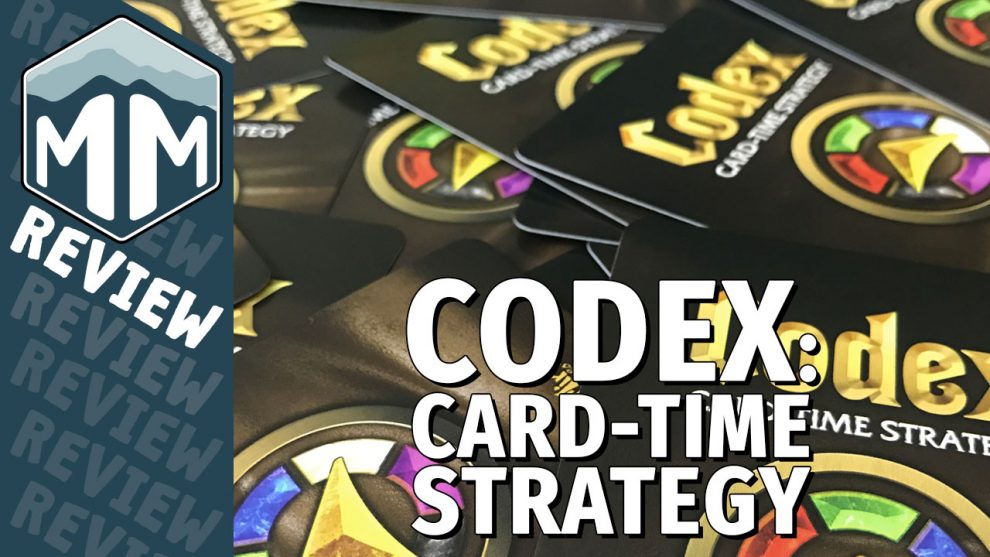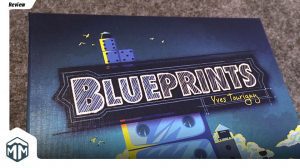Like many people in the board game hobby, I had a humble start as a Magic: The Gathering player. On any given Friday night all through college, you could find me at our local game store participating in a Friday Night Magic tournament. Granted, I was never very good at the game, but my upbringing in many other collectible card games at least made me somewhat proficient at slinging cardboard.
At some point I hit a dilemma all too common to Magic players; life got in the way and I didn’t have the time to keep up with a “lifestyle game.” When you no longer have the time, it’s even harder to justify spending the money that it takes to stay relevant.
Here we are, years later, and I’m so glad that I set aside Magic to discover the joy of modern board games. Still, I would be lying to say that I’m not tempted by every flashy new collectible game that catches my eye. I’ve longed for a game that fills this void without eating up both my wallet and schedule.
Enter Codex: Card Time Strategy

A Quick Note
I suppose I should preface this review by letting you know that I’m writing from the perspective of someone with a history of competitive card games under his belt. I certainly do not think that this game is only targeted towards that kind of person, but I do think that you will better understand some of the things that make this game so interesting if you do have that history.
Some Background on Card Games
As I mentioned before, competitive collectible card games have been around for quite some time. There have been many games that have produced some innovative ideas, but few have stood the test of time as long as Magic: The Gathering has. After 20 years of making the game, they’ve really figured out who they are and what they do. This really makes it hard for other newer games to jump into the market. Most of these collectible card games hold a spot in the limelight for a short time, but ultimately fall out of favor under Wizards of the Coast’s shadow.
In the past few years, we’ve begun to see something interesting happening in the world of card games. As more players hit the same time spent vs money spent wall that I previously mentioned, a new market has begun to form that caters to them. These games are called Living Card Games. Unlike a traditional collectible game, LCG’s forgo random packs of cards for all inclusive sets. Games like Netrunner, Ashes: Rise of the Phoenix Born, and the recent Arkham Horror the Card Game give you everything you really need to play in the base game and then slowly release bigger expansions with new cards. This new format is great, but I’ve yet to see a game that really takes this idea and gives the same feel as Magic.
Well, that day has come.
The Perfect Fit
Codex is a competitive card game that mostly fits in the Living Card Game style of format. There is a base set that comes with two different factions, expansions with more factions, and a deluxe box that comes with all of the cards from the base set and expansions. This is meant to be a stand alone game though, so a monthly/quarterly cycle of new cards won’t be in the mix similar to other LCGs.
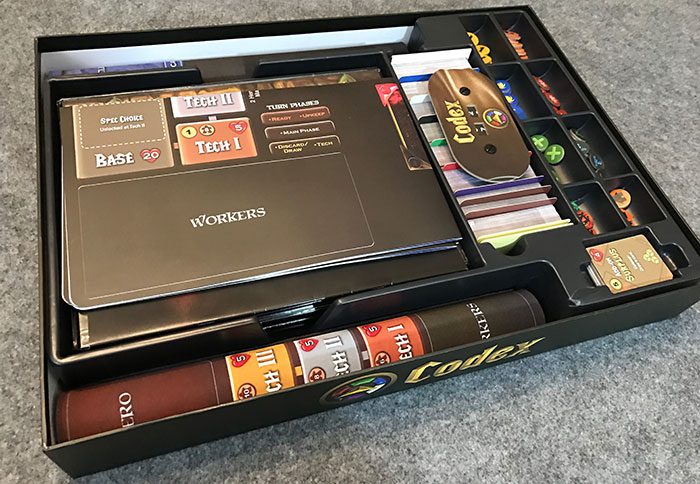
No matter which angle you approach this game from, you’ve got a ton of options and replayability at your fingertips. During a game of Codex, you and a friend will each pick a faction (color) and will take that faction’s starter deck. Unlike a traditional card game, you won’t start with a fully built deck. Instead, each player has a binder full of cards that can potentially be added to their deck as the game proceeds. This means that you can adjust your strategy to combat your opponent as the game continues. Similarly to most competitive card games, the goal of the game is to reduce your opponent’s life total to zero.
There are a ton of things that Codex does to fix common problems in card games while also finding interesting new ideas to play with, but before diving into those, let’s take a look at how the game actually plays.
How to Play Codex: Card-Time Strategy
Once each player has picked their faction (or factions for the advanced rules) and has shuffled their ten card starter deck, they will set aside the three heroes that align with their faction along with their worker card. Each player starts with a worker card that shows how many resources (money) that they will get each turn. The first player will start with four workers while the second player starts with five. Once each player’s starting cards are set up, they each draw five cards and begin.
Codex revolves around five different phases that take place on each player’s turn:
1. Ready
2. Upkeep
3. Main Phase
4. Discard/Draw Phase
5. Tech Phase
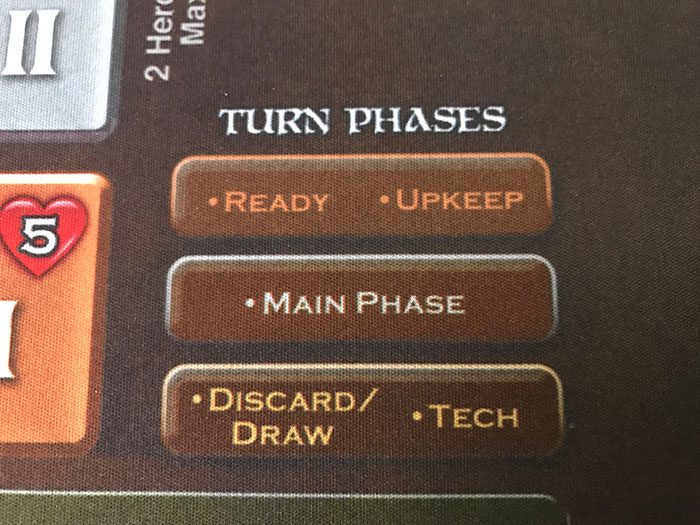
Ready Phase
During the ready phase, the active player takes all of the cards that were activated during the previous turn (turned sideways or “tapped”) and turns them back to their normal position to indicate that they can be activated again during the turn.
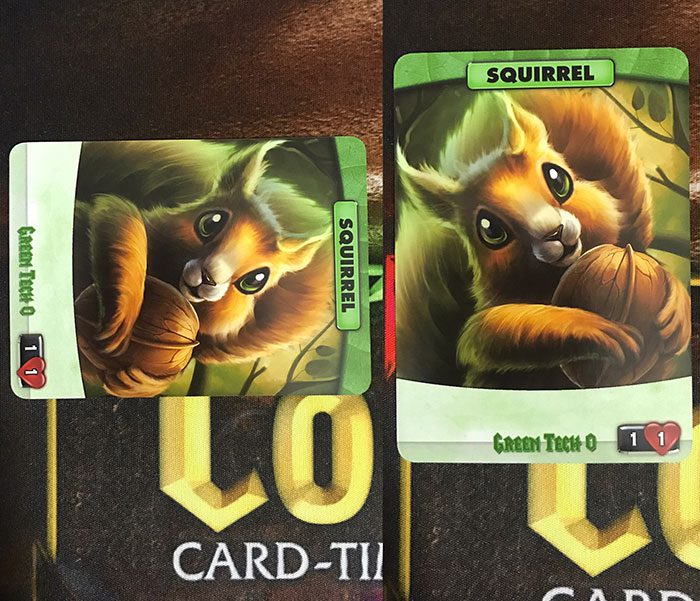
Upkeep Phase
During the Upkeep phase, some cards will activate special abilities. Aside from those abilities, the player will take a number of coins equal to the current number of workers that they have in their worker area.
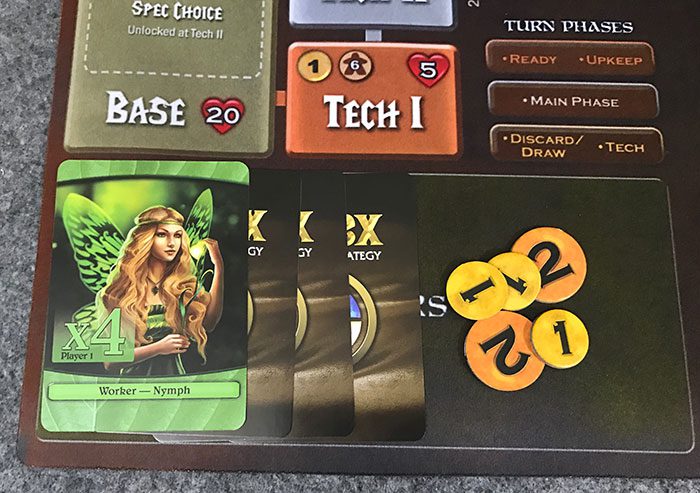
Main Phase
The main phase is the meat of the game. This is where you will be playing cards, initiating combat, etc. I’ll get to more of this later, but just keep in mind that most of the game takes place here.
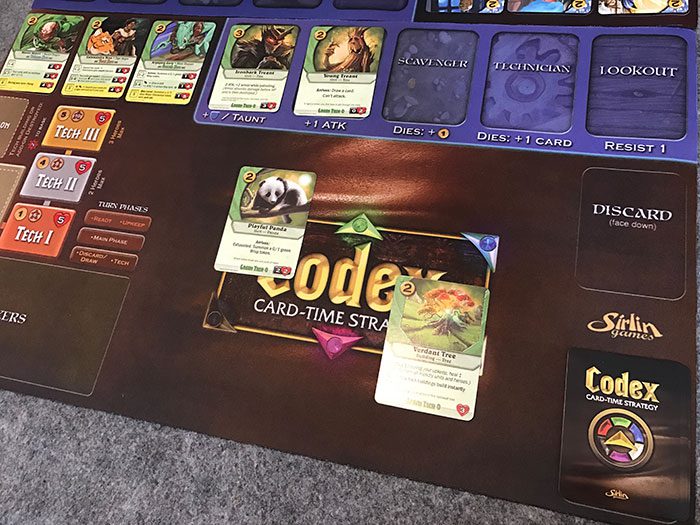
Draw/Discard Phase
Unlike most competitive card games, you will discard your entire hand at the end of the turn and then draw back up to the number you discarded plus two more (with a max of five.) This means that playing all of the cards in your hand one turn will lead to a turn with only two cards.
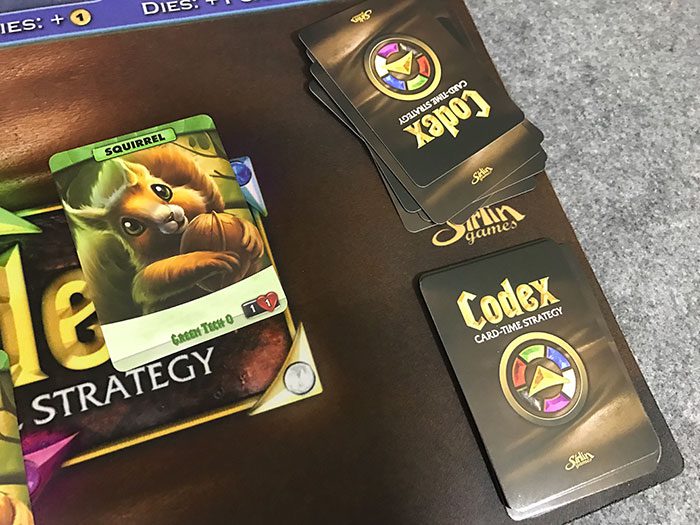
Tech Phase
This is where you will build your deck. Once you’ve discarded and drawn new cards, you will be able to pick any two cards of your codex (card binder) to put into your discard pile (which will eventually be shuffled into your deck.)

Playing a game with a bunch of phases may seem strange and complicated for anyone who has never played a competitive card game before, but I can assure you that as you play the game, you will realize that it is actually pretty straightforward.
Card Time Strategy
Now that you know the guts of the game, you might be asking, why is this any better than other card games? Good question!
One of the most interesting angles that Codex takes is it’s Real Time Strategy theme. If you’re unfamiliar with this, an RTS is a type of video game in which each player commands some sort of army and slowly builds up its forces and buildings until they can overpower the other player. You really get a sense of this theme as you play the game.
A couple things that point to the theme here are the way that workers work. Each turn you are able to increase the number of permanent workers you have by one, but you must also permanently discard a card from your hand and pay one gold to do so. This leads to many tough decisions, but it also gives the game a sense of growth. Since you start out with few resources and end up producing more and more each turn it really feels like you’re gaining more and more traction. Not to mention as you gain more money each turn, you are able to play increasingly powerful cards!
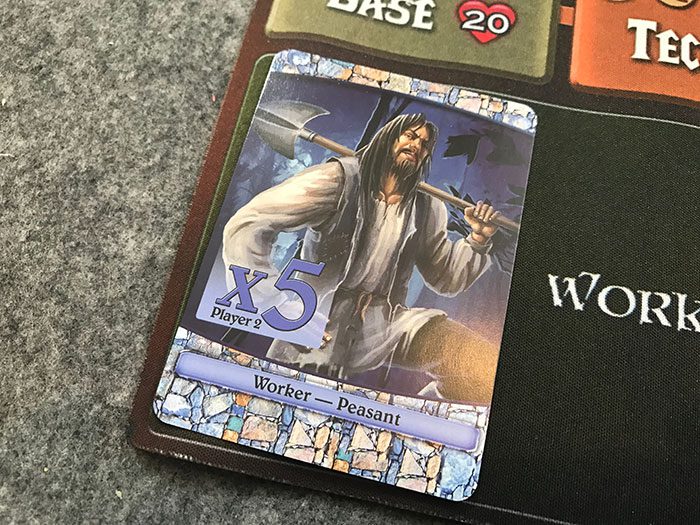
A second way the theme plays into the gameplay is the use of Tech Buildings. Cards that you can put in your deck are either spells which can only be played with a hero of the same faction/color in play or cards labeled Tech 0, 1, 2, or 3. Each of these tech cards can only be played when you have upgraded your tech buildings to the correct level. Again, this produces a feeling of “advancement” in the game. It is not only a matter of having enough resources to play a big card, but you must also have upgraded your buildings to the correct level (which takes a full turn per level.) These buildings can also be attacked by your opponent, meaning that you could lose them and must make sure to keep them defended.
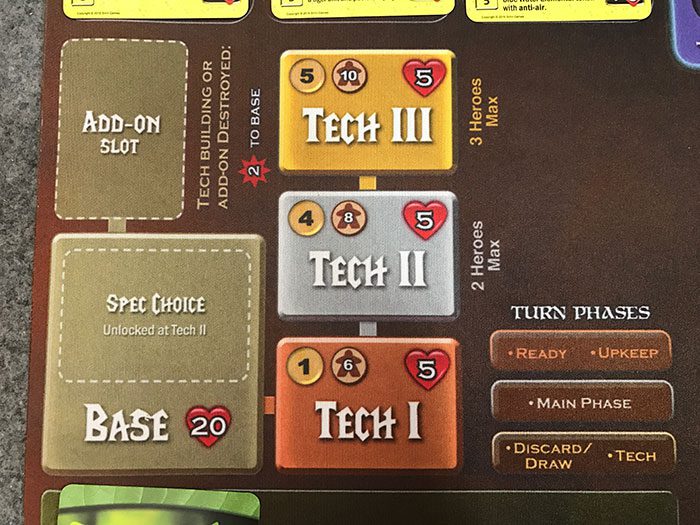
Just like most real time strategy games, there are lots of different factions to choose from. Each faction has a completely different feel to them which means that you will be able to find tons of different combinations to build your deck with. As you begin to see how your opponent is playing, you can choose the faction’s cards that best fit the strategy you wish to counteract theirs. These factions each have a hero that act like a normal unit with special powers. Each one can be leveled up to unlock even more abilities. As you play, you will have to pick a “main faction” upon building your second Tech building. This means that you will have to choose one faction of which you can only play their tech 2 and 3 cards. While you are still able to play lower tech and spell cards, this decision really forces the player to hone in on what their strategy will be.
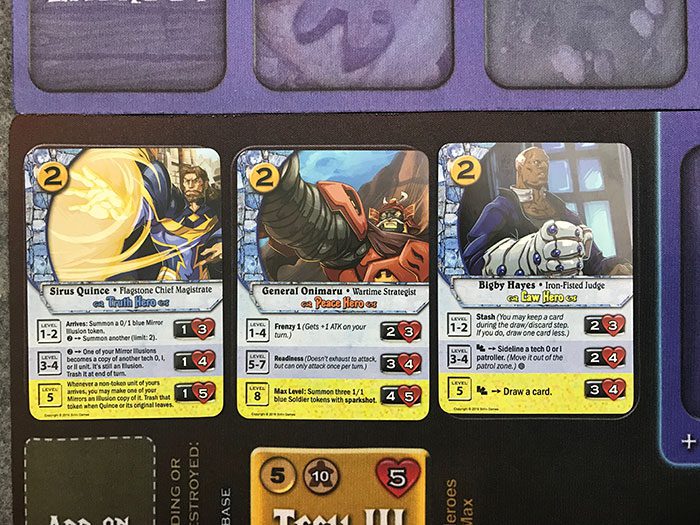
One final key difference from most card games is the way that you defend yourself. Most games either employ a system that says that all creatures/units/monsters on the field have to be destroyed before attacking the player directly, or take a more lax approach by allowing you to choose whether to attack either the player or the units, or let the defending player determine how they will defend themself with their troops. Codex takes an interesting approach in allowing for a little bit of each of those methods. Both players have five slots for their patrollers (defenders), each with a different special ability. One forces the opponent to attack it first and gives that unit a higher defense rating, another increases the attack rating of the unit, the third gives the player an extra coin when it dies, the fourth gives the player an extra card when it dies, and the final position forces the opponent to pay an extra coin in order to use any spells or abilities on it. Each one of these allows for a unique benefit, but it can be hard to know which is best in the moment. Once all “defending” units have been destroyed, the opposing player has the option to attack non-defending creatures, tech buildings, or the player’s health directly.
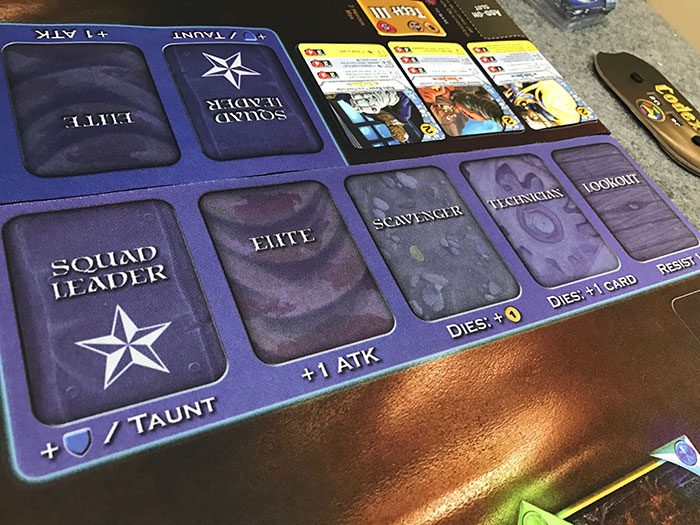
So much more…
I’ll be honest, I really had a hard time boiling this game down into a review worth reading. There is so much in this game that I’d love to focus on, but I don’t want to simply rewrite the rulebook. I’ve pointed out some of the main things that really stand out within Codex, but upon playing it, there are so many other great little design choices that you will come upon.
Of the many things I enjoyed, I think the intentional progression based design of Codex is really what makes this game shine. What I mean is that each game feels like it tells a story. You start out with little money and low power units and slowly are able to build up a steady stream of income and are able to play much more powerful units and buildings. To the core, the game is designed to hit a climax instead of holding a steady game until someone suddenly wins. This doesn’t mean that the game is unfair, but rather that the game grows and becomes more exciting the farther you are into it.
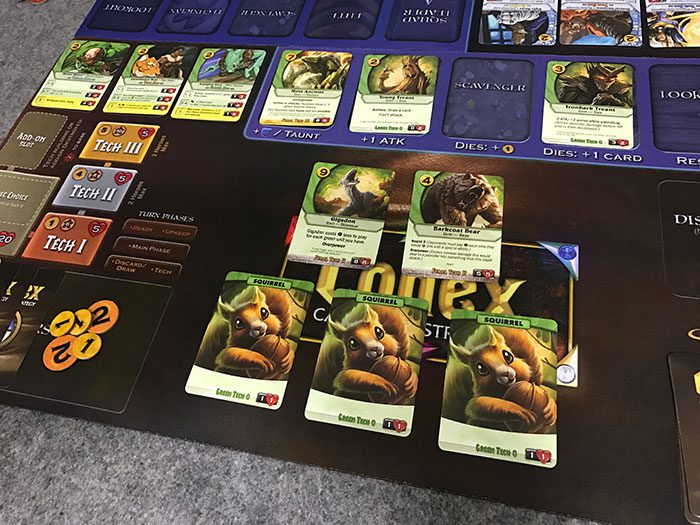
Despite all of the game’s strengths, there are certainly some things that don’t live up to the standard that is mostly present. For one, I found the rulebook to be a challenge at times. Considering my history in card games, I was able to learn the game fairly quickly. Still, I often found myself searching for specific rules for lengthy periods of time. For the most part, all of the information that you need is there, but at times I don’t think it is presented in a way that is very intuitive. I can only imagine that it might be a much larger challenge for someone who is new to the genre completely.
Other than the rulebook, the game can be pretty fiddly with setup and teardown. Each game you will have to fill in your binder with the factions you select and then empty it out at the end of the game. Still, despite all of that, I think the mechanics make up for it.
I keep coming back to new players, but I am still on the fence about how non-seasoned card game players will adapt to this system. It isn’t as complicated as it might seem, but there are still many moving parts that must be considered. Codex gets rid of the extremely complicated timing rules of Magic by using asynchronous play, but I won’t shy away from the fact that there is still a lot to consider each turn. In fact, I think that the sheer amount of possible decisions that can come up each turn is one of the game’s strongest assets. It might be a lot to take in at first, but man is there some depth to play around with.
Final thoughts

Codex is really good at what it’s trying to be. It won’t win over your non-gaming friends like a game like Codenames, but its depth of play and number of options will certainly keep the strategically minded gamer intrigued for a long time. Sirlin Games was kind enough to send me a copy of the Deluxe Edition which contains all 7 colors with three factions in each. I honestly don’t think I’ll ever fully be able to explore the possible combinations that the game has to offer. Even if you only buy the starter set, the red and green factions still have a ton of variety in them since you’ll build your deck differently each time. While most LCG’s still thrive off of expandability, I really think that Codex has enough in its seven color sets to make it a worthwhile stand alone game that doesn’t need anything else. The price tag for the deluxe edition might catch some people off guard, but compared to a similar amount of game from an LCG or a traditional collectible card game, it’s a deal.
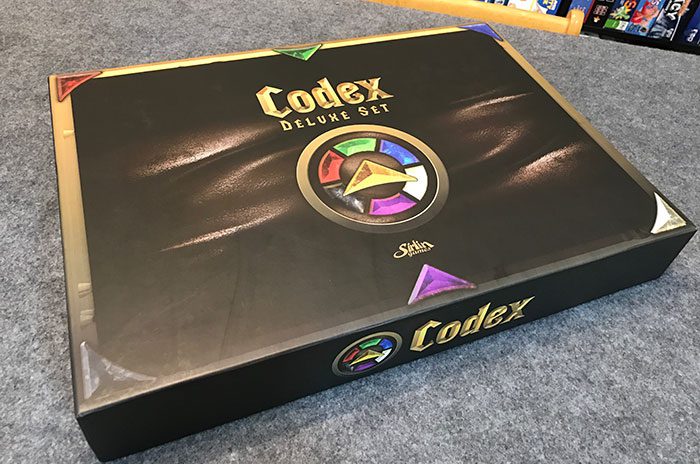
This is such a unique yet familiar game, and I really like that feeling. So far, the best description I’ve been able to give is that it feels like the best parts of Magic: the Gathering, Hearthstone, and Dominion wrapped up in one nice package. Doesn’t that just sound like a good time?!
If you have a background of collectible card games like I do, check this game out. If you’ve ever wanted to get into a collectible card game but just couldn’t find it worth the time/money, give this game a shot. If you specifically have a void in your life that Magic the Gathering has left wide open, go buy this game now!
What do you think about Codex: Card-Time Strategy – Deluxe Set? Give us your opinions about what you like and/or dislike about the game in the comments below!


